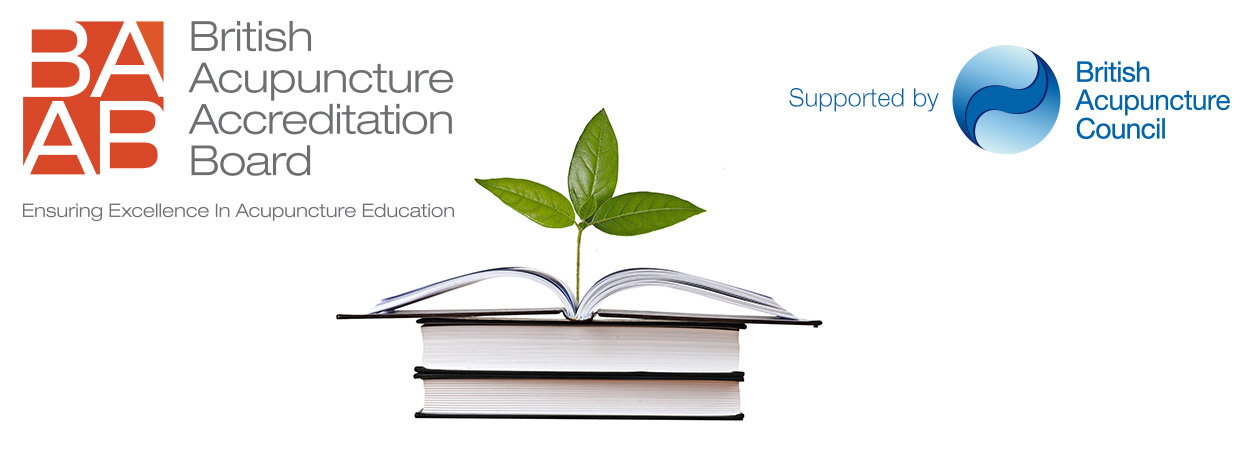Many people decide to study acupuncture because they have experienced the benefits of acupuncture treatment and are fascinated by this very different system of medicine. Sometimes people are looking for a new career and want to retrain in a profession that has values that are important to them. A career in acupuncture is both rewarding and challenging. Make sure you have the very best start by choosing a course accredited by the BAAB.
What courses are available?
There are a variety of accredited courses around the UK, each with their own unique style and resources to give you a professional education in acupuncture. You’ll find a brief description of them here with links through to their websites.
How do I choose the best course for me?
We monitor and support all our courses to ensure they continue to provide excellent standards across a range of criteria from teaching and learning to student representation, library facilities to clinical training, so you’ll find these benefits in all our courses. Your choice may be to do with a convenient location for you, or because of the particular style of a course. You may prefer a dedicated private college or a University environment. Most courses hold Open Days, so you can go and see for yourself and talk to teachers, students and patients about what to expect. Links to all our courses are here. Click here to hear Annie’s advice about choosing the best course for you.
Do I have to have previous experience in healthcare?
No, our courses give you all the education you need to become an acupuncturist who is knowledgable, competent and safe. From anatomy all the way through to setting up your practice, you’ll graduate with all the skills and experience to become a professional practitioner.
How long does it take to qualify?
Full time study takes three years. Courses are often available at weekends or in the week to suit your circumstances and can also be done on a part-time basis, over a longer peri-od. If you have relevant previous experience or training, APEL schemes may offer you exemption from parts of the training.
How much will it cost?
Fees vary between institutions and start from about £5000 a year for a full time pro-gramme, usually payable in instalments. Most courses are eligible for either Career Devel-opment or Student Loans which can help you with your fees. Click on the links to our courses for their fees and what financial support they can offer.
What qualification will I get?
All our courses meet honours degree level standards, and depending on the course you choose you may achieve a Licentiate, a Diploma, a BSc or an MSc qualification.
What is involved in studying acupuncture?
We aim to produce practitioners who are reflective, research-minded, knowledgable, competent and safe. This involves a broad and deep education which will include:
Chinese medicine
history, culture, medical theory, diagnostic skills, differential diagnosis
Conventional medical sciences
anatomy, physiology, pathology, medical terminology, red flags, pharmacology
Clinical skills
point location, moxibustion, tongue and pulse diagnosis, cupping, electro-acupuncture, palpation
Clinical Practice
a minimum of 400hrs of working with patients in a clinical setting, of which you’ll spend 200 hours taking increasing responsibility for patient care.
Research
research methodology, critical reading, using research to identify best practice
Reflective practice
reflecting on action to engage in a process of continuous learning, bringing theory and practice together
Patient-practitioner skills
communications, empathy, listening
Business skills
accounting, advertising and promotion, business planning, setting up a practice
To find out more about studying and practicing acupuncture, watch our videos of professional acupuncturists talking about their courses and what they love about their work.
Will I be able to practice straight away?
Yes, on graduation from a BAAB accredited course, you’ll be eligible to join the BAcC and either join a practice or set up your own. The BAcC can give you a lot of support in setting up your practice as well as the help you’ll get on your course.
Are there jobs for acupuncturists?
Most acupuncturists are self-employed, and have to put effort into establishing a practice. It can take a few years to get your practice going, because one of the best ways to attract new patients is by recommendation from existing patients. Some integrated or comple-mentary practices employ acupuncturists and occasionally there are opportunities in the NHS.
What will I earn?
As a self-employed acupuncturist, your income is dependant on how busy you are. In pri-vate practice, most acupuncturists charge between £30 an £60 per session depending on their location. For most people, 20-30 patients a week provides a reasonable income, but its important to remember you have to pay rent, expenses and tax out of your earnings. Some acupuncturists are busier than that and some less so.
What’s it like to be an acupuncturist?
Listen to some of our members talking about what they like about their work as acupuncturists and the inspiring post graduation activities they are involved with. The National Careers Service also has information about acupuncture as a career.
Can I join the BAcC as a student?
Yes, student affiliate status with the BAcC is free. This enables you to be involved with the profession from the start of your training, benefit from website information, debate and links, contribute to the development of BAcC services for students and enjoy the annual conference.

